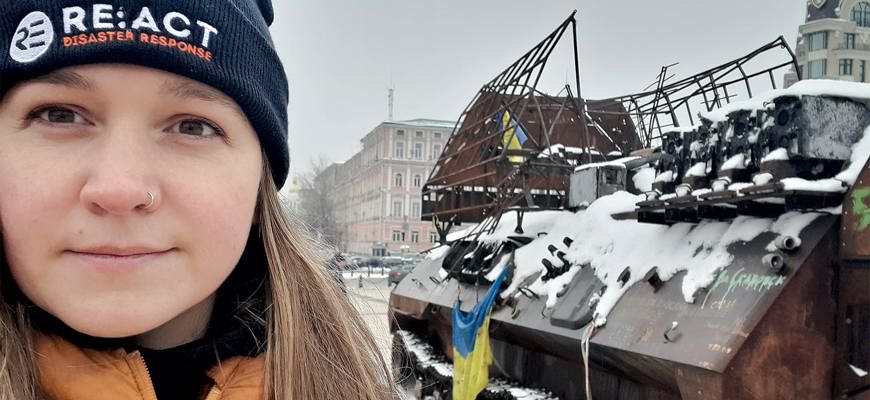Ukraine: a lawyer’s part

From the outset of the Covid-19 pandemic, the importance of wellbeing and community have been highlighted. People in good health, like me, became acutely aware of our privilege in that respect. Conscious of the level of need, and having an unusually empty diary, I volunteered with a community group delivering food parcels to people who were shielding.
Searching for other roles, I came across residential training courses with a charity called RE:ACT Disaster Response, in Chilmark, Wiltshire. I completed the application form, and forgot about it. A few weeks later, I was surprised to receive an acceptance.
I had to remind myself who RE:ACT are. They “specialise in high tempo, dynamic and complex emergencies and crises – applying military expertise in planning and problem solving, collaborating with humanitarian partners to rapidly develop and share situational awareness, identify critical gaps in the response and fill those gaps in the fastest time possible with the most effective solutions”.
I’m a lawyer. I have no emergency services training, certainly no military experience… but I can do problem solving, I can do collaboration and I wanted to do humanitarian.
Wise words from a past mentor came to mind: be careful not to “de-select yourself” from opportunities, especially when you aren’t the appropriate decision-maker. The charity had accepted me, so I booked some annual leave and packed my tent and sleeping bag (all volunteers camp during courses). I absolutely loved it.
Invigorating training
Through 2022 I attended numerous courses at RE:ACT’s headquarters, a decommissioned military base.
The Domestic Responders course has a focus on Britain and reflects lessons learned from assisting the NHS, including volunteering in morgues, during the pandemic. The International Responders course focuses more on physical fitness and emergency first aid. Volunteers have been deployed following hurricanes in the Caribbean, earthquakes in Nepal and flooding in Mozambique.
We practised first aid, how to secure a broken window or ripped roof with tarpaulins and timber, navigation, communications, contingency planning and organising a helicopter evacuation. Every time I came home, I felt invigorated by the volunteers’ energy – I even noticed I was more productive at work.
In the summer, I was thrilled to be invited to attend the Operational Leadership course, my first experience of dedicated leadership training. Our mentor was Elizabeth Stileman MBE, a former Royal Logistics Corps major. The roleplay exercise was the most intense, mentally taxing immersive training I have ever undergone. We spent 48 hours with a map of an imaginary island, sometimes contradictory bits of notes about available resources, the vulnerable inhabitants, the political, criminal and energy situations, restrictions, some phone numbers, one phone and a whiteboard. You are the humanitarian team on the ground immediately post-disaster. Solve it.
My legal background undoubtedly helped. To gather, hold and manipulate reams of information, sift the relevant from the irrelevant, recall “trivial” but now critical detail, think creatively but logically, and finally to communicate effectively – problem solving repeatedly and calmly – these are all within the trained lawyer’s skillset. I passed the course, and still benefit in my professional and personal productivity.
I also volunteered with RE:ACT and their partners on smaller tasks, e.g. loading lorries with donated medical supplies going from Ayrshire to Ukraine. Packing “field” midwifery kits and two newborn incubators, I couldn’t shake the images they conjured. Those lorries were organised by Andrea Fraser, another Scottish lawyer, who has demonstrated unbelievable personal stamina to fund and organise humanitarian aid to Ukraine.
Answering the call
When the opportunity arose to be considered for deployments in Ukraine, I put my name forward. RE:ACT organised specially tailored Hostile Environment Awareness Training which drilled us in safety, communications, trauma first aid, even emergency driving skills.
In mid-November, working from home and pondering the office Secret Santa, I find a message on my phone from Paul Taylor MBE, RE:ACT’s international operations manager. From yesterday. Yikes. I feel as a responder that I should have been more, well, responsive. He wants to know my availability to join a deployment to assist RE:ACT’s Ukrainian hot food distribution work.
I pause. I type a reply ending “I’ll let you know as soon as I can”, then delete it. Why hesitate at the jump? I request the time off and reply, more usefully, “Hi Paul, I can get it off work.”
At 5pm, I start pulling out my passport and my kit, and write a packing list to focus my mind and calm the nerves. I pore over RE:ACT’s risk management folders, and with CNN’s 24 hour Ukraine coverage as background, I pack my bags.
Into Lviv
Our mission is, first, supply chain due diligence on the hot food distribution that RE:ACT is funding in various locations, and secondly, securing further United Nations funding to continue the programme. On 2 December, we fly to Eastern Poland for the train across the border.
I’m surprised to find a long queue. I had expected only an exodus from Ukraine. But people’s lives are more complex than that. I imagine their stories and the ties that keep them inside a country at war. Some appear to be doing supply runs back and forth across the border. Though cold, the queue is amiable. Children distract us, like frayed edges – a recurring theme of war.
Passport control, metal detectors, a man barred from entering who switches to shouting in English when he sees us. Does he think we can help, or is he simply desperate? Either way, we can only nod to him, bow our heads and move on. I feel embarrassed at being able to cross so easily.
We don’t speak Ukrainian; we can’t even read the Cyrillic alphabet, so we can’t communicate with anyone unless they do us the favour of knowing some English.
The tall diesel locomotive is industrial on the outside but comfortable inside, with USB sockets, clean and litter free. It departs and arrives exactly on time, which proves a recurring theme on Ukrainian public transport. A screen alternates between cartoons and safety messages – images of unexploded ordnance and missiles. Curiosity is discouraged. Do not climb onto tanks. This flicker between ordinary and extraordinary continues for our eight days.
I charge my phone and check our itinerary, route and the air raid shelter map for the umpteenth time. Air raid sirens appear as notifications on our phones. The RE:ACT Ops team have mapped the nearest shelters onto an interactive Google map: the modern side of war.
Ukrainian Border Force board the train – armed women in camouflage fatigues. I remember the standard advice, “Never let anyone walk away with your passport.” I hand mine to the soldier who motions for it and walks off. She hands it back shortly after, stamped, and I hide my relief.
Lviv feels distinctly normal. Yes, there are many men in camouflage, but otherwise people go about their lives, Christmas shopping.
We meet our partners, the Ukrainian Education Platform, a national charity repurposed for humanitarian purposes. Project manager Mariya speaks excellent English, even understanding our varied accents. RE:ACT’s donations fund hot food distribution in multiple locations to evacuees. The partnership makes it happen. We discuss the project structure, supply chain and procurement policies.
After dark, the city gets louder. Mains electricity has switched off so diesel generators rattle and rumble outside pharmacies and food shops. Choral music from an ornate Orthodox church signifies a “rolling mass”. People are hurrying in, and walking out. A peaceful transformation by way of prayer. Do people turn to their God in wartime, or lose their faith?
Later, Paul gives us refresher medical training. We practise putting on our own tourniquets one-handed and giving injections to counter blood loss from major trauma. Then we test our communications kit (primary, secondary and tertiary systems). We’re in constant contact with RE:ACT’s Chilmark Ops team and our insurers who operate an emergency evacuation team, if evacuation is possible.
I sleep terribly that night, my subconscious full of chaotic, cluttered imagery, unused to being inside a country under attack.
Dnipro: life in the Blitz
Dynamic risk assessments from the Ops team allow us to board an overnight train and head 600 miles east to Dnipro city, around 80 miles from the front line to the south in Zaporizhzhia region, and 155 miles from the front line to the east in Donetsk region – familiar names from news reports.
 The Dnipro river, now the physical manifestation of the Ukrainian/Russian divide, is a wide, choppy, deep blue mass. Upstream, it separates mountain ranges; downstream, it holds apart armies. A political power, by natural law. The Clyde back home feels like a muddy burn in comparison.
The Dnipro river, now the physical manifestation of the Ukrainian/Russian divide, is a wide, choppy, deep blue mass. Upstream, it separates mountain ranges; downstream, it holds apart armies. A political power, by natural law. The Clyde back home feels like a muddy burn in comparison.
The food production facility is immaculate, hygienic, organised. The staff are so conscious of the food staying hot: the insulated travel boxes lose just one degree every hour. They serve us borscht (traditional soup) from the menu. It’s tasty but most importantly, for Ukrainians fleeing their homes, it’s hot, comforting and provided by kind and friendly local helpers as soon as they arrive.
We visit Dnipro Women & Children’s shelter – run by Globa22, another Ukrainian charity – where RE:ACT provides the food funding. We learn that Dnipro’s population has grown by about 200,000, or 20%. The shelter is respectful and welcoming. The Ukrainians we meet see themselves “as one”. Here, people tend to be accommodated with others from the same area – this helps families, provides comfort, and connections that might help people find paid work. Some of the building is derelict, but volunteers have helped renovate the shelter wing and there’s a welcome feeling of calmness.
Children sit on windowsills playing games on a shared smartphone. Having already lost years of school due to Covid, there are 8-9 year olds who can hardly read. The internet is their teacher.
Dnipro is a purgatory. People evacuate from near the front line, but then need to choose – stay in Dnipro, return home, or continue west to quieter parts and restart their lives. No electricity means an economic downturn. Inevitably long term socio-economic issues are developing.
A third RE:ACT-supported, charity-run building also offers physiotherapy. Elderly people sit in the dark but are so thankful for the building and service. A woman whose son died on the front line asks to hug Paul, and just holds on to him. When asked what she would like to say, she replies, “Please don’t forget the elderly in war.”
It’s a heavy day. We are seeing good things, that exist because of bad things. The constant duality is emotionally difficult. I can feel it again now, writing this.
 Globa22 has repurposed a supermarket into an overnight shelter, including a baby and children’s room. There’s industrial LED lighting, no privacy, and tinny supermarket music across the sleeping area. A fast food restaurant lets people use their toilets. There are no showers.
Globa22 has repurposed a supermarket into an overnight shelter, including a baby and children’s room. There’s industrial LED lighting, no privacy, and tinny supermarket music across the sleeping area. A fast food restaurant lets people use their toilets. There are no showers.
Dnipro train station is a very high risk site. Russian attacks have focused on major infrastructure. It’s late afternoon but the electricity is out. We don’t know if it’s scheduled or spontaneous, temporary or permanent. The air is thick with diesel fumes, engine noise and the screech of metal on metal. Conversation is illustrated by clouds of iced breath. There is a “Blitz” feeling.
RE:ACT food is given out in an underground restaurant, sandbags against the window, a few lightbulbs behind the bar, otherwise in darkness. The food is cold and limited, but welcome. It feels somehow illicit but it’s the opposite – innocent people just trying to live their lives.
One night, warning comes via the air alert app. We hear the deep hollow noise of missiles overhead. It is surreal. I expected to feel terrified, but instead feel angry that innocent people are being subjected to this erratic terror. Unlike the Ukrainians, I know I can leave and my loved ones are safe back home.
Some people stay in their hotel rooms; others move to the bunker. The reception staff don’t leave their desks. This was nearly day 300 of the invasion. Trust in the Ukrainian anti-aircraft protection is high, but it isn’t infallible. We had driven by a bombsite that day.
Our phones show fuzzy amateur videos of round, orange fire in a grey sky. Afterwards we hear there were around eight missiles, all shot down. We’re also told that Russia is using more low flying drones which are more difficult for air defences to pick up. After we left, Dnipro was not so lucky.
 In the morning, we meet Atlas Logistique to strengthen humanitarian partnerships and pick up as much local knowledge as we can; later, we meet UN OCHA: the Office for the Coordination of Humanitarian Affairs. Our goal is to secure funding to enable hot food distribution to continue through winter and for as long as it’s needed. We are trying to connect our local partners with the international funds intended for this type of proven scheme. The meetings are all positive and we press hard for target dates for funding to be unlocked. We write reports for RE:ACT and schedule follow-ups.
In the morning, we meet Atlas Logistique to strengthen humanitarian partnerships and pick up as much local knowledge as we can; later, we meet UN OCHA: the Office for the Coordination of Humanitarian Affairs. Our goal is to secure funding to enable hot food distribution to continue through winter and for as long as it’s needed. We are trying to connect our local partners with the international funds intended for this type of proven scheme. The meetings are all positive and we press hard for target dates for funding to be unlocked. We write reports for RE:ACT and schedule follow-ups.
Kyiv: final stage
Onward to Kyiv. On the train we recharge – ourselves, our contingency plans and our devices.
At the British Embassy in the capital we discuss our work and, crucially, our goals. We arrange a meeting with another UN OCHA rep, ensuring that everyone across the country is up to speed – pressing our message to avoid anything being lost within such a sprawling organisation.
I had hoped to see the revolutionary Maidan Square, scene of the 2013 wave of demonstrations and civil unrest demanding closer Ukraine-European integration, involving up to 800,000 civilians over three months of protest. I hadn’t appreciated just how massive the square would be. To stand there, acknowledging the sheer luck that I was born into stability and unity, is sobering.
We catch the train across to Poland and fly home, a full view of rolling, lush, green Britain.
Final thoughts
My scribbled notes from that first RE:ACT course record the seven humanitarian principles: humanity, impartiality, neutrality, independence, voluntary service, unity, and universality. Paul told us from the outset that our personal med kits were fully stocked and if we came across anyone who needed help, we were expected to exhaust our supplies to help them survive.
I don’t know enough about history, or politics. In the face of conflict, I do know the common tragedy is that people become victims. It drives home why humanitarianism is necessary. Everyone in need deserves help, free of judgment, if we are able to give it.
Many lawyers may believe that their skillsets rest within documents alone, but an agile legal mind can be applied to a multitude of wider contexts and environments – including war zones. In a world seemingly saturated with bad news, I’ve found action to be some cure for anxiety, hopelessness and frustration.
I encourage everyone, lawyers and non-lawyers alike, if they are able, to find their own area of special interest and consider how their professional skills might transpose into that sector to help. My own experience has been, professionally and personally, incredibly rewarding.
Regulars
Perspectives
Features
Briefings
- Criminal court: Court declines rape sentence guidelines
- Employment: Reopening discipline proceedings – fair do?
- Family: Mediation – will Scotland catch up?
- Human rights: Abortion, protests and safe access zones
- Pensions: A good funding challenge for employers?
- Property: Title conditions – what’s in a name?
- Property: Scottish Barony Register – 2022 annual report
- Property: QES in a post-Covid world
In practice
- Public policy highlights: February 2023
- Accredited paralegal roundup
- Risk: Wills – the signing pitfalls
- Keep the faith with fax
- Calculating your carbon footprint
- Digital focus in new SLCC rules
- The Trades House: a charity funds management option
- The Society in a changing world
- Ask Ash: Homeworking when ill?







